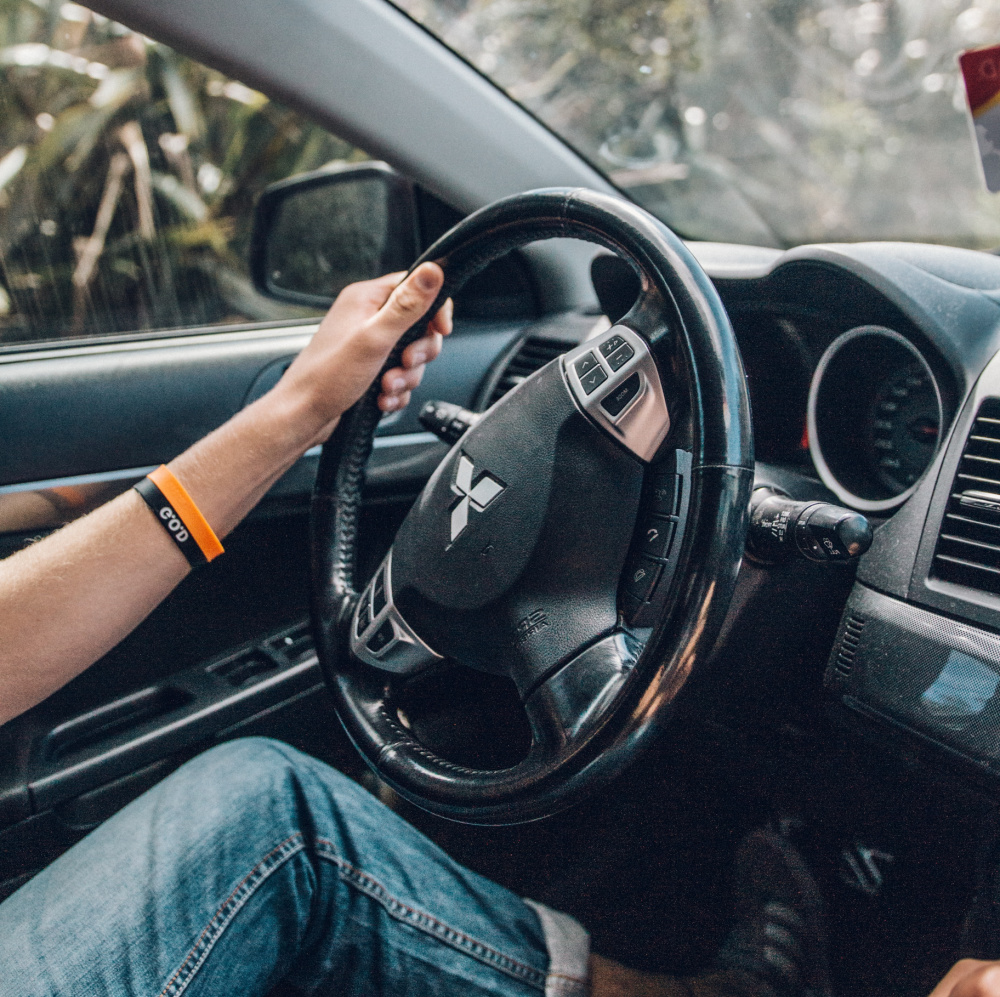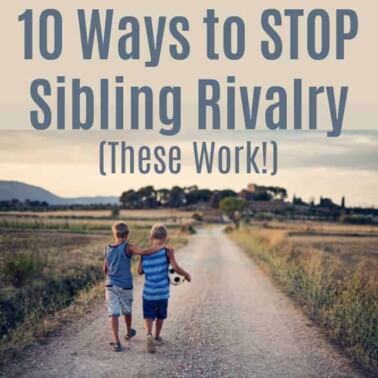This post may contain affiliate links. Please read our disclosure policy.
Establishing curfews for teenagers is one of the first things you’ll have to do as they start spending time outside of the home. Raising teens isn’t a “one size fits all” parenting deal – every teenager, like every parent, is different and requires different boundaries. The curfew for a 15-year-old is going to look much different than the curfew for a 16-year-old or a 17-year-old’s curfew.

Do Teens Need A Curfew?
I’m not a “one size fits all” kind of person. I’m not going to say “Yes” or “No” to this question because it varies based on the parents, the children, the situation that they are in, the family, the city, etc…
I know that what works for some families doesn’t work for others. The same thing goes for kids & curfews… Some parents set them, and some don’t.
While you need to do what works best for your family, it’s always good to take other viewpoints into consideration. To help with that, I’m going to share the pros of setting a curfew for your children.
Let’s Begin with the Question, “Why Do Teens Need a Curfew?”
We are talking about both kinds of curfews: the set-in-stone type of curfew & the general “be home around this time” curfew.
- Most parents set a curfew to keep kids safe, help them avoid trouble (as much as they can), give them more freedom under supervision, encourage self-control, and establish trust between parents and children.
- Set the expectation that your teen will be back home by a specific time each evening.
- To know that their child will arrive home safe each night, giving their parents or guardians peace of mind before they go to sleep.
- Avoid Dangers on the Road. According to NHTSA, driving at night is the most dangerous time of day to drive due to limited visibility, drunk drivers, and driver fatigue. It is at night that the most severe teen crashes occur. [1]
- Follow the State & City Laws. Many areas have Curfew Laws or Driving Curfews for teenagers. These are the legal requirements for teenage curfews, which are enforced by local police departments.
- To avoid TIRED TEENAGE DRIVERS. “Sleepiness is a leading cause of motor vehicle accidents among drivers aged 16 to 29 years!” [2]
THE BEST RULE TO KEEP THEM SAFE: “Leave-By Curfew”
A few weeks ago, my husband was telling me about his friend’s teenage son. In their house, they had an 11:00 curfew for their 16-year-old.
Unique Driving Curfew for 16 year olds and 17 year olds.
On Saturday night, at 10:55, that teenager’s parents were on their phones, using their Life360 app, following his location and speed (this app also has Crash Detection and more). They knew that he was going to be late, but instead of calling to let them know that he would be a few minutes late, he went 75 mph in a 55 mph zone.
Luckily, he arrived home safely. He also made it on time, but his parents had a long talk with him about leaving on time, etc. They also told him that they would rather receive a call that he is going to be late than a call that he has been in an accident.
THAT SPARKED AN IDEA FOR US. We decided to make a rule in our house for when our teens started driving.
Instead of a “Be Home By” curfew, we would have a “Leave By” curfew.

What Is a “Leave By” Curfew?
For our family, we decided to have a “Leave by” Curfew instead of a “Be Home By” Curfew because there are too many unpredictable and unchanging things that can happen on the car ride home.
I wanted to avoid our kids doing things like…
- Speeding to make it home by a specific time.
- Driving through stop signs or yellow lights to “make-up time.”
- Making poor decisions (going around drivers or passing someone when it isn’t safe) to be home sooner.
This also works to our benefit because there are not many excuses when it comes to leaving on time. If they are late to get home, but they left on time, we understand. If they are late to get home because they waited too long to leave, that’s another story.
Plus, with the many location tracking apps (Find My, Life360, Bark, etc), we will know exactly when our kids leave.
How To Determine Curfew Time for Teens
When establishing a curfew for teens, think about what works best for your teenager, your family, and you. The average curfew for a 16-year-old might work well for one family but not for another. Follow your gut. Here are some guidelines to help you find the best curfew time for your teen.
- WAKE UP TIME: Do you have to wake up early for work? Does your teen wake up early? If so, try setting an earlier curfew. This lets you know that your child will be home at a decent hour so you (or your teen) can go to bed on time and get enough rest in order to wake up early the next morning.
- SCHOOL NIGHTS VS. WEEKENDS: School nights usually have a different curfew than non-school nights. Consider sports, homework, and sleep time for the school night curfew. The American Academy of Pediatrics suggests that teens between 13 and 18 years of age should sleep eight to 10 hours per night regularly for their best health.
- SAFE AREA: Keep in mind that if you live in an area that is considered to be a high-crime area, you may want to have your teen come home sooner, to avoid unnecessary risks.
- DEFAULT CURFEW: Set a default curfew. This is a set time that your teen can keep in mind as he makes plans. It will probably be different on the weekends (with an earlier default curfew time on the weekdays). This will be the time that your teen will know is the curfew. It won’t change, so there will be no need to ask, “What time do I need to be home?” It is unchanging from week to week.
You can always adjust their curfew for a special event or activity, but overall, the more consistent you are with the default curfew, the less frustration and stress you’ll have down the road. - MATURITY LEVELS: Keep in mind that your child’s curfew should reflect their level of responsibility and maturity, not their age. So use your best judgment when setting a curfew for your teenager.

Curfew for 15-Year-Old
I will not say that this is the right answer or the best curfew advice, but I’ll tell you what worked for our 15-year-old.
SCHOOL NIGHTS:
On school nights, I didn’t have to set up a curfew because we have a sort of unspoken rule that we don’t make plans on weeknights. They are busy enough with homework, practice (four kids playing sports each season means someone has a practice every night of the week), religious activities (like youth group), and dinner as a family.
If they go to a friend’s house after school, I tell them to be home in time for dinner, so usually around 6:30. If they ask to stay later (or if they go after dinner), I just pick them up by 8:00 or 8:30 because I don’t want to impose on school night routines. Most of their friends have younger siblings, which makes school nights a bit more hectic. I don’t want to add to that with an extra person in the house.
WEEKENDS or SCHOOL BREAKS (SUMMER, HOLIDAYS):
The weekends are a little different. At 15, they are not driving alone (not in North Carolina, anyway), so we don’t have to worry too much. At this age, they are probably getting something to eat, watching a movie with friends, or going to a friend’s house. The parent that is driving (myself or another parent) typically sets the curfew, and I’d say we all aim for somewhere between 11:00-11:30.
Now, in the summer, our kids tend to hang out with neighborhood friends since we live in a neighborhood with many of their peers. On these nights, they can walk home, and they know that they should be home by 11:00. If they need an extension (maybe they are walking a friend home first), they just call or text.
What is the Average Curfew for 15-year-olds?
When surveyed, the average curfew for 15 year old kids, set by parents or guardians, was 8:00 on school nights and 11:00 on weekends. Many parents said that if the child is responsible, they will extend the curfew to 11:30 or even midnight on Friday or Saturday night.

Curfew for 16-Year-Olds
Talk to your teenager. Explain what responsibility looks like when it comes to their curfew. Go over the “Leave By” rule and discuss what that means. Tell your child that you trust them to leave on time and expect them to communicate with you about where they will be and what they will be doing.
Be flexible when opportunities for special activities are presented. If they are going to the movies and you know that it ends after their standard leave-by time, just ask your teen to send you a text or call when they are leaving. Open communication will be the key to building trust with a 16-year-old (and children of every age.)
What is the Average Curfew for 16 year olds?
When parents were asked, “What is the curfew for 16 year olds in your house?”
They found that the average curfew for 16-year-olds, set by parents or guardians, was 8:00-9:00 on school nights and 10:30-11:30 on weekends. Many parents said midnight was acceptable on weekends if they knew where the child would be and if the child was responsible and trustworthy.

Curfew for 17-Year-Olds
While younger children often have early bedtimes (I used to put our kids to bed at 7:00,) as they age, they gain our trust. An early curfew for 17 year old children might not be needed anymore because with that trust comes more freedom (unless they break that trust, of course). Of course, most of us have these boundaries to keep our children safe.
Recently, I read an article on HealthyChildren.org which highlights the viewpoint of several pediatricians: “A good starting point is to ask your teen what she thinks a reasonable curfew should be. Remember, a curfew is a tool to keep your child healthy, productive, and safe.
Your comfort level, your teen’s comfort level, and the safety of your community should all be part of the discussion.
Consider whether your teen’s friends live nearby. Does he have a weekend job? You’ll be on the defensive if your child’s curfew is earlier than his close friends. Knowing other parents and discussing common rules comes in handy here.”
What is the Average 17 year olds Curfew?
When surveyed, the average curfew for 17-year-olds, set by parents or guardians, was 9:00-10:00 on school nights and 11:30-12:00 (midnight) on weekends. A 17-year-old’s curfew may look much different depending on jobs, sports, and sense of responsibility. It can also change throughout the year, as your child earns more freedom.

How to set a curfew
Curfews are a great way to teach responsibility. They are set in place to make sure that your child is safe, to teach your child time management, and to encourage self-control.
With that being said, it’s important to remember that every teenager and family is different, so what works for some may not work for others. It’s up to you to decide what’s best for your child and family.
1. Set or Flexible Curfew
First off, decide which kind of curfew you will have: Set curfew or flexible curfew.
SET CURFEW:
If you will have a “set curfew” where there is a set time that is followed.
Ex: On weekends, the curfew time is 11:00 pm, but on weeknights, it is 9:00.
FLEXIBLE CURFEW:
With a flexible curfew, you don’t have a set-in-stone time, but it’s more of a “just be responsible and be home before I go to bed.” type of curfew.
Example: Your teen comes to you with the plan, for example- A football game followed by getting a bite to eat at a local restaurant. From there, you tell your teen a time to aim for, knowing that it all depends on what time the game is done, etc.
So, you may not have a “general” curfew time, but instead, you know that your child will keep you posted on what’s going on throughout the night so you know what time to expect your teen. You can set a time depending on the circumstances of the night. With so many apps to “follow” your teen throughout the night, “Find My”, Life360, and Bark, it’s easy to keep track of them to know that they are safe.
2. Choose a curfew time with your teen:
If you decide to go with the set curfew time (see above for the difference), you’ll need to choose a time for your child to be home.
Include Your Child:
As with many rules, boundaries, and actions that involve our children, including the kids in the decisions will go a long way. You can still have their input, even if you have the final say about the curfew time. They are more likely to uphold a time if they have a part in setting it (the same thing goes with (setting consequences that actually work).
Ask your child what time they think is reasonable and start there. Maybe move it up or back by 30 minutes or an hour. It’s important that you are comfortable with the time and that your child feels that it is reasonable (or at least understandable), as well.
Be sure to take all factors into consideration:
- Does your state have a driving curfew for teens?
- Does your child have an early morning?
- Is your child getting enough sleep?
- Does your teen fall asleep easily? (if not, you may need to allow for extra time to “unwind” at home before bed.)
- Does your child have a medical advice diagnosis or treatment plan that restricts late nights? (taking medication at a specific time each night, sleep disorder, etc.)
- Will they be able to call you if plans change? Are they responsible enough to do so?

Alternatives to Curfews
As I mentioned above, there isn’t a “one size fits all” when it comes to parenting… and curfews go along with that. If you are looking for an alternative to a curfew, I would consider the option of “SAY GOODNIGHT.”
If your child is trustworthy, you may find that you don’t need a curfew. You may want to try giving them the freedom to make the decision on what time to come home. This ONLY works if you can trust your child and you have had many heart-to-heart talks in the past about making good choices, calling you if needed, etc.
This works best if you set up this one rule…
HERE IS THE RULE THAT MAKES THE ALTERNATIVE WORK: The “SAY GOODNIGHT” Rule
As soon as your child comes home, they immediately come to you and tell you that they are home. They come close enough for a hug and kiss (and maybe a conversation about the night if you aren’t too sleepy.) The rule is that even if the parent is asleep, the teen must wake them to say that they are home – with a hug and a kiss.
You will know exactly what time they came home. Plus, this gives you a chance to look for any warning signs or red flags (because you will see them, hear them, and smell them when they are saying goodnight & giving you that hug and kiss.)
MORE POSTS YOU MIGHT LIKE:













